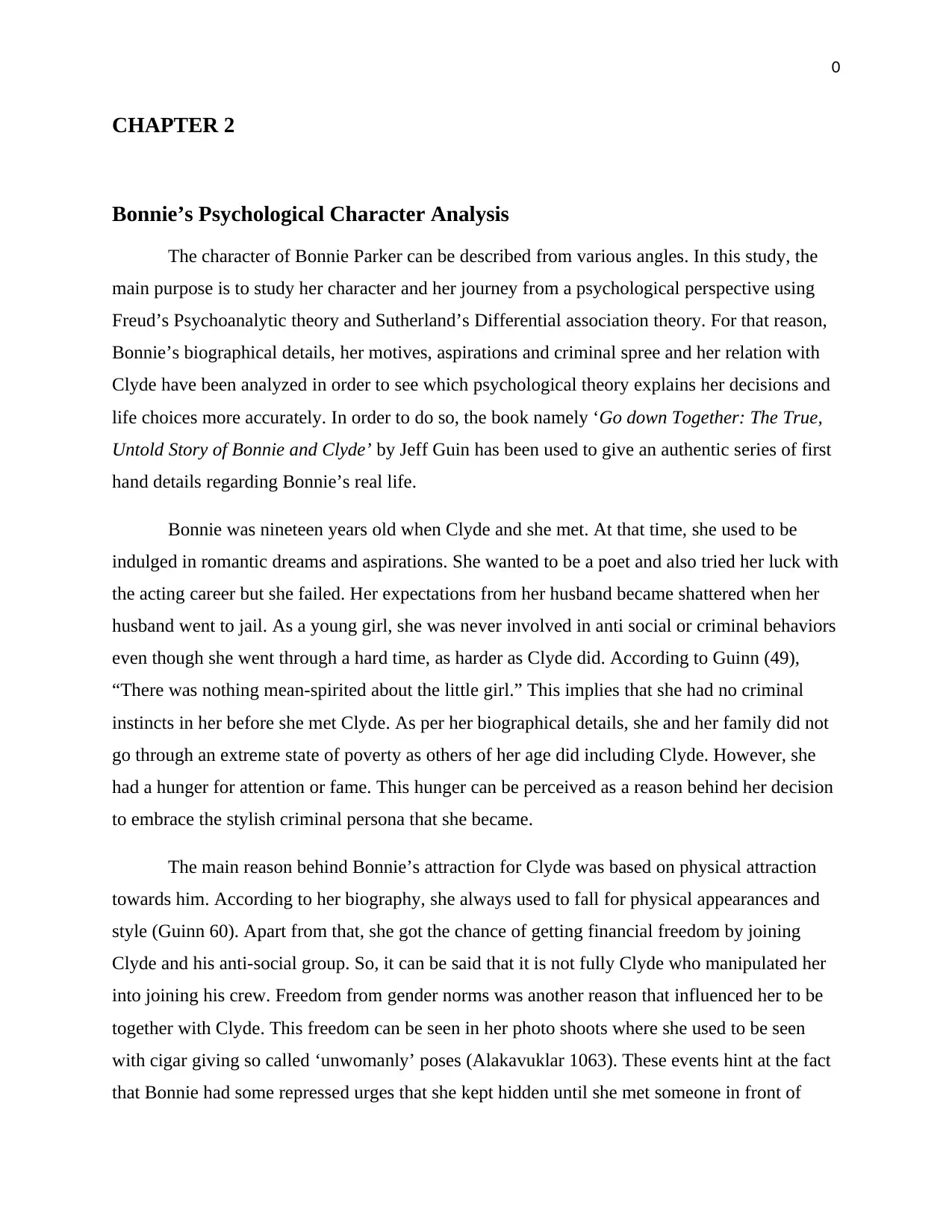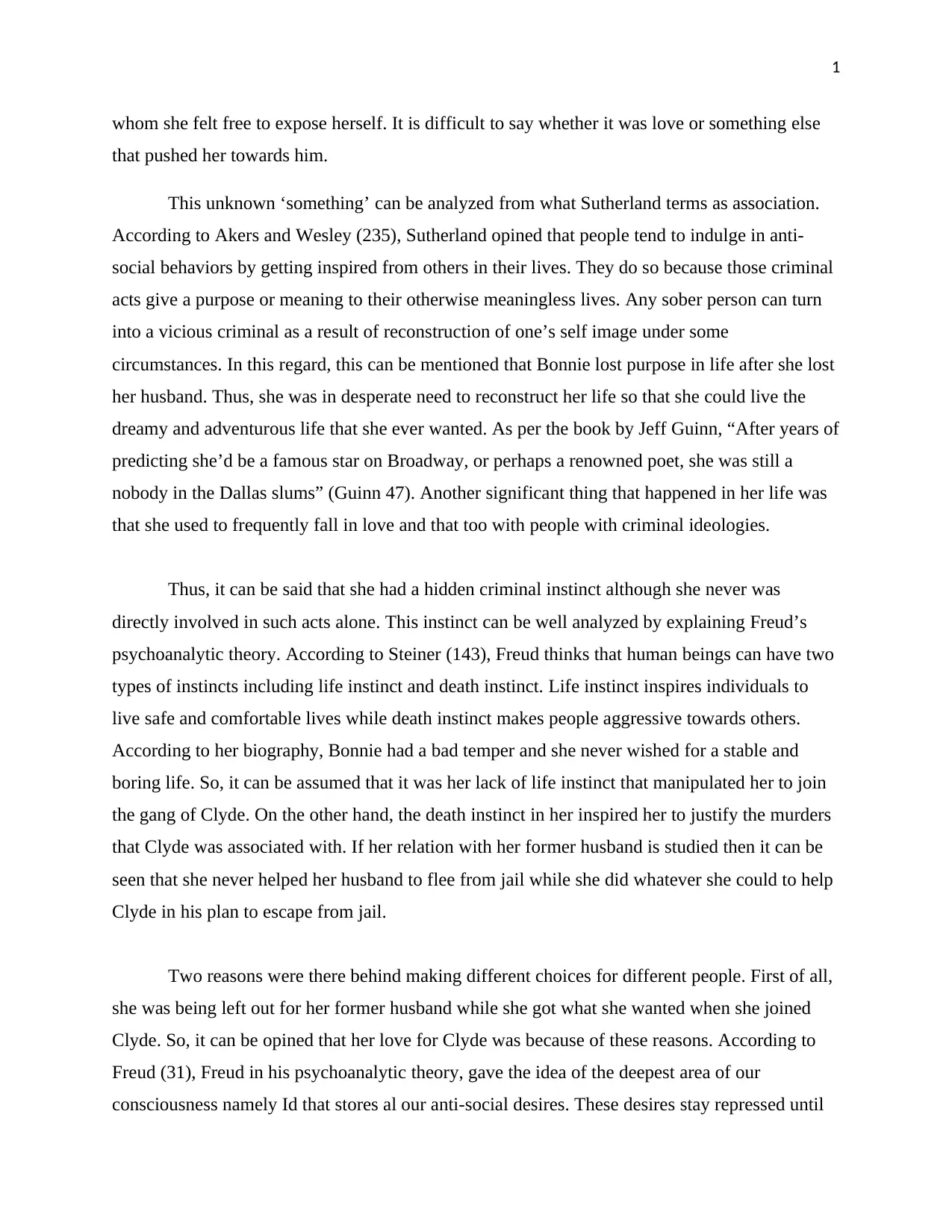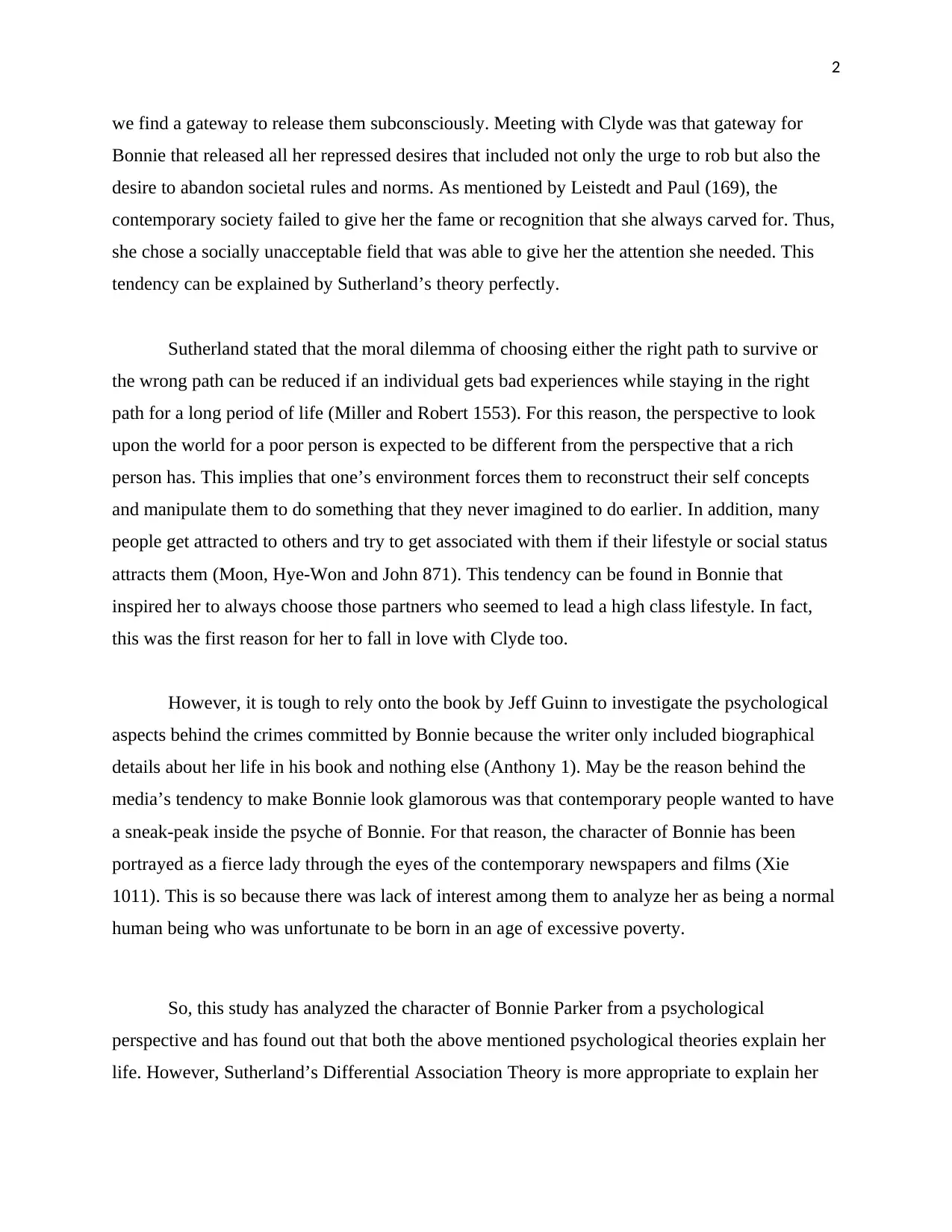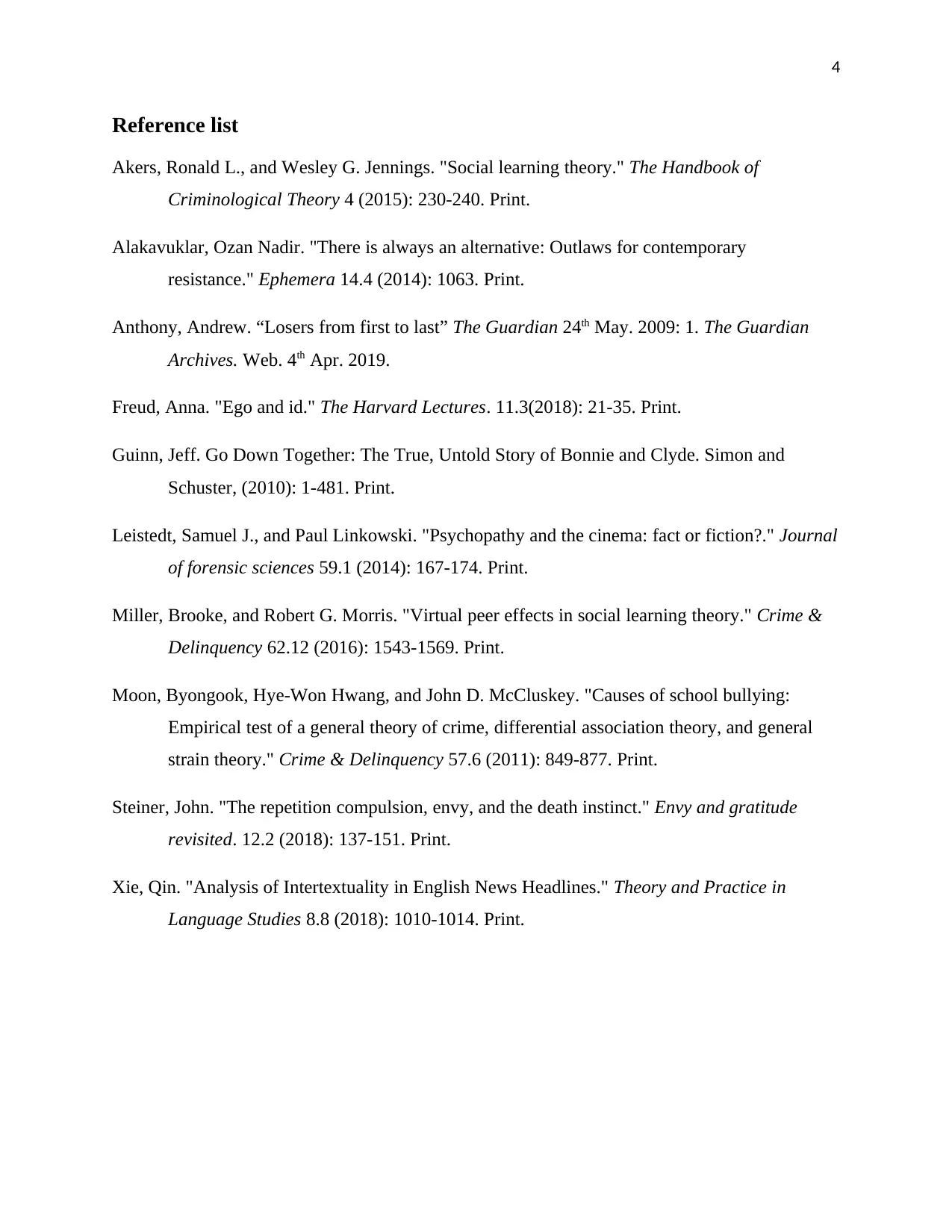Analyzing Bonnie Parker's Criminality: A Psychological Study
VerifiedAdded on 2023/01/13
|5
|1776
|86
Essay
AI Summary
This essay provides a psychological analysis of Bonnie Parker, examining her criminal behavior through the lenses of Sigmund Freud's Psychoanalytic Theory and Edwin Sutherland's Differential Association Theory. The study delves into Bonnie's biographical details, motivations, aspirations, and her relationship with Clyde Barrow, drawing on Jeff Guinn's book 'Go Down Together: The True, Untold Story of Bonnie and Clyde' for authentic insights. The analysis explores Bonnie's early life, her attraction to Clyde, and the influence of social and environmental factors on her choices, including repressed urges and a desire for fame. The essay investigates how Freud's concept of life and death instincts and Sutherland's theory of association explain Bonnie's actions. It compares her choices and the impact of her environment, concluding that Sutherland's theory offers a more fitting explanation of her psyche, considering the impact of her social environment. The study also acknowledges the media's portrayal of Bonnie and the limitations of the available biographical information.

0
CHAPTER 2
Bonnie’s Psychological Character Analysis
The character of Bonnie Parker can be described from various angles. In this study, the
main purpose is to study her character and her journey from a psychological perspective using
Freud’s Psychoanalytic theory and Sutherland’s Differential association theory. For that reason,
Bonnie’s biographical details, her motives, aspirations and criminal spree and her relation with
Clyde have been analyzed in order to see which psychological theory explains her decisions and
life choices more accurately. In order to do so, the book namely ‘Go down Together: The True,
Untold Story of Bonnie and Clyde’ by Jeff Guin has been used to give an authentic series of first
hand details regarding Bonnie’s real life.
Bonnie was nineteen years old when Clyde and she met. At that time, she used to be
indulged in romantic dreams and aspirations. She wanted to be a poet and also tried her luck with
the acting career but she failed. Her expectations from her husband became shattered when her
husband went to jail. As a young girl, she was never involved in anti social or criminal behaviors
even though she went through a hard time, as harder as Clyde did. According to Guinn (49),
“There was nothing mean-spirited about the little girl.” This implies that she had no criminal
instincts in her before she met Clyde. As per her biographical details, she and her family did not
go through an extreme state of poverty as others of her age did including Clyde. However, she
had a hunger for attention or fame. This hunger can be perceived as a reason behind her decision
to embrace the stylish criminal persona that she became.
The main reason behind Bonnie’s attraction for Clyde was based on physical attraction
towards him. According to her biography, she always used to fall for physical appearances and
style (Guinn 60). Apart from that, she got the chance of getting financial freedom by joining
Clyde and his anti-social group. So, it can be said that it is not fully Clyde who manipulated her
into joining his crew. Freedom from gender norms was another reason that influenced her to be
together with Clyde. This freedom can be seen in her photo shoots where she used to be seen
with cigar giving so called ‘unwomanly’ poses (Alakavuklar 1063). These events hint at the fact
that Bonnie had some repressed urges that she kept hidden until she met someone in front of
CHAPTER 2
Bonnie’s Psychological Character Analysis
The character of Bonnie Parker can be described from various angles. In this study, the
main purpose is to study her character and her journey from a psychological perspective using
Freud’s Psychoanalytic theory and Sutherland’s Differential association theory. For that reason,
Bonnie’s biographical details, her motives, aspirations and criminal spree and her relation with
Clyde have been analyzed in order to see which psychological theory explains her decisions and
life choices more accurately. In order to do so, the book namely ‘Go down Together: The True,
Untold Story of Bonnie and Clyde’ by Jeff Guin has been used to give an authentic series of first
hand details regarding Bonnie’s real life.
Bonnie was nineteen years old when Clyde and she met. At that time, she used to be
indulged in romantic dreams and aspirations. She wanted to be a poet and also tried her luck with
the acting career but she failed. Her expectations from her husband became shattered when her
husband went to jail. As a young girl, she was never involved in anti social or criminal behaviors
even though she went through a hard time, as harder as Clyde did. According to Guinn (49),
“There was nothing mean-spirited about the little girl.” This implies that she had no criminal
instincts in her before she met Clyde. As per her biographical details, she and her family did not
go through an extreme state of poverty as others of her age did including Clyde. However, she
had a hunger for attention or fame. This hunger can be perceived as a reason behind her decision
to embrace the stylish criminal persona that she became.
The main reason behind Bonnie’s attraction for Clyde was based on physical attraction
towards him. According to her biography, she always used to fall for physical appearances and
style (Guinn 60). Apart from that, she got the chance of getting financial freedom by joining
Clyde and his anti-social group. So, it can be said that it is not fully Clyde who manipulated her
into joining his crew. Freedom from gender norms was another reason that influenced her to be
together with Clyde. This freedom can be seen in her photo shoots where she used to be seen
with cigar giving so called ‘unwomanly’ poses (Alakavuklar 1063). These events hint at the fact
that Bonnie had some repressed urges that she kept hidden until she met someone in front of
Paraphrase This Document
Need a fresh take? Get an instant paraphrase of this document with our AI Paraphraser

1
whom she felt free to expose herself. It is difficult to say whether it was love or something else
that pushed her towards him.
This unknown ‘something’ can be analyzed from what Sutherland terms as association.
According to Akers and Wesley (235), Sutherland opined that people tend to indulge in anti-
social behaviors by getting inspired from others in their lives. They do so because those criminal
acts give a purpose or meaning to their otherwise meaningless lives. Any sober person can turn
into a vicious criminal as a result of reconstruction of one’s self image under some
circumstances. In this regard, this can be mentioned that Bonnie lost purpose in life after she lost
her husband. Thus, she was in desperate need to reconstruct her life so that she could live the
dreamy and adventurous life that she ever wanted. As per the book by Jeff Guinn, “After years of
predicting she’d be a famous star on Broadway, or perhaps a renowned poet, she was still a
nobody in the Dallas slums” (Guinn 47). Another significant thing that happened in her life was
that she used to frequently fall in love and that too with people with criminal ideologies.
Thus, it can be said that she had a hidden criminal instinct although she never was
directly involved in such acts alone. This instinct can be well analyzed by explaining Freud’s
psychoanalytic theory. According to Steiner (143), Freud thinks that human beings can have two
types of instincts including life instinct and death instinct. Life instinct inspires individuals to
live safe and comfortable lives while death instinct makes people aggressive towards others.
According to her biography, Bonnie had a bad temper and she never wished for a stable and
boring life. So, it can be assumed that it was her lack of life instinct that manipulated her to join
the gang of Clyde. On the other hand, the death instinct in her inspired her to justify the murders
that Clyde was associated with. If her relation with her former husband is studied then it can be
seen that she never helped her husband to flee from jail while she did whatever she could to help
Clyde in his plan to escape from jail.
Two reasons were there behind making different choices for different people. First of all,
she was being left out for her former husband while she got what she wanted when she joined
Clyde. So, it can be opined that her love for Clyde was because of these reasons. According to
Freud (31), Freud in his psychoanalytic theory, gave the idea of the deepest area of our
consciousness namely Id that stores al our anti-social desires. These desires stay repressed until
whom she felt free to expose herself. It is difficult to say whether it was love or something else
that pushed her towards him.
This unknown ‘something’ can be analyzed from what Sutherland terms as association.
According to Akers and Wesley (235), Sutherland opined that people tend to indulge in anti-
social behaviors by getting inspired from others in their lives. They do so because those criminal
acts give a purpose or meaning to their otherwise meaningless lives. Any sober person can turn
into a vicious criminal as a result of reconstruction of one’s self image under some
circumstances. In this regard, this can be mentioned that Bonnie lost purpose in life after she lost
her husband. Thus, she was in desperate need to reconstruct her life so that she could live the
dreamy and adventurous life that she ever wanted. As per the book by Jeff Guinn, “After years of
predicting she’d be a famous star on Broadway, or perhaps a renowned poet, she was still a
nobody in the Dallas slums” (Guinn 47). Another significant thing that happened in her life was
that she used to frequently fall in love and that too with people with criminal ideologies.
Thus, it can be said that she had a hidden criminal instinct although she never was
directly involved in such acts alone. This instinct can be well analyzed by explaining Freud’s
psychoanalytic theory. According to Steiner (143), Freud thinks that human beings can have two
types of instincts including life instinct and death instinct. Life instinct inspires individuals to
live safe and comfortable lives while death instinct makes people aggressive towards others.
According to her biography, Bonnie had a bad temper and she never wished for a stable and
boring life. So, it can be assumed that it was her lack of life instinct that manipulated her to join
the gang of Clyde. On the other hand, the death instinct in her inspired her to justify the murders
that Clyde was associated with. If her relation with her former husband is studied then it can be
seen that she never helped her husband to flee from jail while she did whatever she could to help
Clyde in his plan to escape from jail.
Two reasons were there behind making different choices for different people. First of all,
she was being left out for her former husband while she got what she wanted when she joined
Clyde. So, it can be opined that her love for Clyde was because of these reasons. According to
Freud (31), Freud in his psychoanalytic theory, gave the idea of the deepest area of our
consciousness namely Id that stores al our anti-social desires. These desires stay repressed until

2
we find a gateway to release them subconsciously. Meeting with Clyde was that gateway for
Bonnie that released all her repressed desires that included not only the urge to rob but also the
desire to abandon societal rules and norms. As mentioned by Leistedt and Paul (169), the
contemporary society failed to give her the fame or recognition that she always carved for. Thus,
she chose a socially unacceptable field that was able to give her the attention she needed. This
tendency can be explained by Sutherland’s theory perfectly.
Sutherland stated that the moral dilemma of choosing either the right path to survive or
the wrong path can be reduced if an individual gets bad experiences while staying in the right
path for a long period of life (Miller and Robert 1553). For this reason, the perspective to look
upon the world for a poor person is expected to be different from the perspective that a rich
person has. This implies that one’s environment forces them to reconstruct their self concepts
and manipulate them to do something that they never imagined to do earlier. In addition, many
people get attracted to others and try to get associated with them if their lifestyle or social status
attracts them (Moon, Hye-Won and John 871). This tendency can be found in Bonnie that
inspired her to always choose those partners who seemed to lead a high class lifestyle. In fact,
this was the first reason for her to fall in love with Clyde too.
However, it is tough to rely onto the book by Jeff Guinn to investigate the psychological
aspects behind the crimes committed by Bonnie because the writer only included biographical
details about her life in his book and nothing else (Anthony 1). May be the reason behind the
media’s tendency to make Bonnie look glamorous was that contemporary people wanted to have
a sneak-peak inside the psyche of Bonnie. For that reason, the character of Bonnie has been
portrayed as a fierce lady through the eyes of the contemporary newspapers and films (Xie
1011). This is so because there was lack of interest among them to analyze her as being a normal
human being who was unfortunate to be born in an age of excessive poverty.
So, this study has analyzed the character of Bonnie Parker from a psychological
perspective and has found out that both the above mentioned psychological theories explain her
life. However, Sutherland’s Differential Association Theory is more appropriate to explain her
we find a gateway to release them subconsciously. Meeting with Clyde was that gateway for
Bonnie that released all her repressed desires that included not only the urge to rob but also the
desire to abandon societal rules and norms. As mentioned by Leistedt and Paul (169), the
contemporary society failed to give her the fame or recognition that she always carved for. Thus,
she chose a socially unacceptable field that was able to give her the attention she needed. This
tendency can be explained by Sutherland’s theory perfectly.
Sutherland stated that the moral dilemma of choosing either the right path to survive or
the wrong path can be reduced if an individual gets bad experiences while staying in the right
path for a long period of life (Miller and Robert 1553). For this reason, the perspective to look
upon the world for a poor person is expected to be different from the perspective that a rich
person has. This implies that one’s environment forces them to reconstruct their self concepts
and manipulate them to do something that they never imagined to do earlier. In addition, many
people get attracted to others and try to get associated with them if their lifestyle or social status
attracts them (Moon, Hye-Won and John 871). This tendency can be found in Bonnie that
inspired her to always choose those partners who seemed to lead a high class lifestyle. In fact,
this was the first reason for her to fall in love with Clyde too.
However, it is tough to rely onto the book by Jeff Guinn to investigate the psychological
aspects behind the crimes committed by Bonnie because the writer only included biographical
details about her life in his book and nothing else (Anthony 1). May be the reason behind the
media’s tendency to make Bonnie look glamorous was that contemporary people wanted to have
a sneak-peak inside the psyche of Bonnie. For that reason, the character of Bonnie has been
portrayed as a fierce lady through the eyes of the contemporary newspapers and films (Xie
1011). This is so because there was lack of interest among them to analyze her as being a normal
human being who was unfortunate to be born in an age of excessive poverty.
So, this study has analyzed the character of Bonnie Parker from a psychological
perspective and has found out that both the above mentioned psychological theories explain her
life. However, Sutherland’s Differential Association Theory is more appropriate to explain her
⊘ This is a preview!⊘
Do you want full access?
Subscribe today to unlock all pages.

Trusted by 1+ million students worldwide

3
psyche because we cannot predict what her life could have been if she would not have met
Clyde.
psyche because we cannot predict what her life could have been if she would not have met
Clyde.
Paraphrase This Document
Need a fresh take? Get an instant paraphrase of this document with our AI Paraphraser

4
Reference list
Akers, Ronald L., and Wesley G. Jennings. "Social learning theory." The Handbook of
Criminological Theory 4 (2015): 230-240. Print.
Alakavuklar, Ozan Nadir. "There is always an alternative: Outlaws for contemporary
resistance." Ephemera 14.4 (2014): 1063. Print.
Anthony, Andrew. “Losers from first to last” The Guardian 24th May. 2009: 1. The Guardian
Archives. Web. 4th Apr. 2019.
Freud, Anna. "Ego and id." The Harvard Lectures. 11.3(2018): 21-35. Print.
Guinn, Jeff. Go Down Together: The True, Untold Story of Bonnie and Clyde. Simon and
Schuster, (2010): 1-481. Print.
Leistedt, Samuel J., and Paul Linkowski. "Psychopathy and the cinema: fact or fiction?." Journal
of forensic sciences 59.1 (2014): 167-174. Print.
Miller, Brooke, and Robert G. Morris. "Virtual peer effects in social learning theory." Crime &
Delinquency 62.12 (2016): 1543-1569. Print.
Moon, Byongook, Hye-Won Hwang, and John D. McCluskey. "Causes of school bullying:
Empirical test of a general theory of crime, differential association theory, and general
strain theory." Crime & Delinquency 57.6 (2011): 849-877. Print.
Steiner, John. "The repetition compulsion, envy, and the death instinct." Envy and gratitude
revisited. 12.2 (2018): 137-151. Print.
Xie, Qin. "Analysis of Intertextuality in English News Headlines." Theory and Practice in
Language Studies 8.8 (2018): 1010-1014. Print.
Reference list
Akers, Ronald L., and Wesley G. Jennings. "Social learning theory." The Handbook of
Criminological Theory 4 (2015): 230-240. Print.
Alakavuklar, Ozan Nadir. "There is always an alternative: Outlaws for contemporary
resistance." Ephemera 14.4 (2014): 1063. Print.
Anthony, Andrew. “Losers from first to last” The Guardian 24th May. 2009: 1. The Guardian
Archives. Web. 4th Apr. 2019.
Freud, Anna. "Ego and id." The Harvard Lectures. 11.3(2018): 21-35. Print.
Guinn, Jeff. Go Down Together: The True, Untold Story of Bonnie and Clyde. Simon and
Schuster, (2010): 1-481. Print.
Leistedt, Samuel J., and Paul Linkowski. "Psychopathy and the cinema: fact or fiction?." Journal
of forensic sciences 59.1 (2014): 167-174. Print.
Miller, Brooke, and Robert G. Morris. "Virtual peer effects in social learning theory." Crime &
Delinquency 62.12 (2016): 1543-1569. Print.
Moon, Byongook, Hye-Won Hwang, and John D. McCluskey. "Causes of school bullying:
Empirical test of a general theory of crime, differential association theory, and general
strain theory." Crime & Delinquency 57.6 (2011): 849-877. Print.
Steiner, John. "The repetition compulsion, envy, and the death instinct." Envy and gratitude
revisited. 12.2 (2018): 137-151. Print.
Xie, Qin. "Analysis of Intertextuality in English News Headlines." Theory and Practice in
Language Studies 8.8 (2018): 1010-1014. Print.
1 out of 5
Your All-in-One AI-Powered Toolkit for Academic Success.
+13062052269
info@desklib.com
Available 24*7 on WhatsApp / Email
![[object Object]](/_next/static/media/star-bottom.7253800d.svg)
Unlock your academic potential
Copyright © 2020–2026 A2Z Services. All Rights Reserved. Developed and managed by ZUCOL.